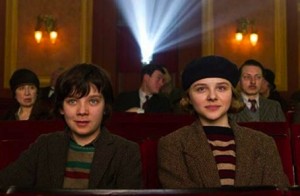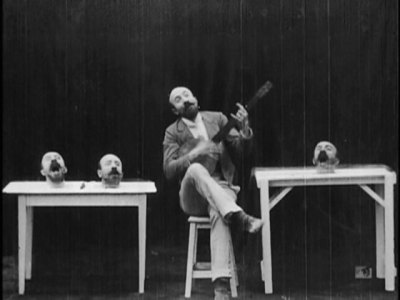“Movies touch our hearts and awaken our vision, and change the way we see things. They take us to other places, they open doors and minds. Movies are the memories of our lifetime. We need to keep them alive.” –Martin Scorsese
No director loves movies more than Martin Scorsese. Knowing that he has spent the past four decades declaring his affection for the movies, you won’t be considered foolish to presume that good ‘ol Marty has finally started to calm down. But you would presume wrong. His voice has never been louder and clearer. Founded on Scorsese’s lifelong love affair with the movies, “Hugo” is a dazzling and magical gem that embraces the very essence of film itself. You can sense an irony in how it uses the latest 3-D technology to remember the earliest existence of filmmaking, but there is a more profound explanation behind this technique:
As a majestic tribute to silent films and a landmark in 3-D filmmaking, “Hugo” acknowledges the eternal significance of the past while simultaneously providing needed hope for the future.
A great portion of Hugo is set in the Montparnasse station of 1931 France. Hidden within the station’s giant clock is Hugo Cabret (Asa Butterfield), an orphaned 12-year-old with a talent for fixing things. When Hugo’s not tightening the screws and adjusting the levers of the clock, he’s sneaking his way through the crowded spaces of Montparnasse, stealing food from bakeries and fruit carts. The boy has no choice. The only thing that his father (Jude Law) left him was the broken automaton that they were determined to rebuild. Holding on to the belief that the machine contains a valuable message from his departed father, Hugo intends to finish the work that he and his dad had started.
 With zero resources, Hugo is forced to steal machine parts from an old, cranky toymaker named George Melies, played by Ben Kingsley. His delinquencies are inevitably discovered by the old man. But that’s okay, cause this leads Hugo into forming a friendship with the affable Isabelle (Chloe Moretz), George’s goddaughter. Eventually, the two youngsters work together in an attempt to uncover the secrets of the toymaker’s past, which is unknown to few and forgotten by many. About halfway through, the movie slowly delves into its deeply emotional core. And because this journey is seen through the eyes of eager children, we feel the sense of wonder that was poured in its creation.
With zero resources, Hugo is forced to steal machine parts from an old, cranky toymaker named George Melies, played by Ben Kingsley. His delinquencies are inevitably discovered by the old man. But that’s okay, cause this leads Hugo into forming a friendship with the affable Isabelle (Chloe Moretz), George’s goddaughter. Eventually, the two youngsters work together in an attempt to uncover the secrets of the toymaker’s past, which is unknown to few and forgotten by many. About halfway through, the movie slowly delves into its deeply emotional core. And because this journey is seen through the eyes of eager children, we feel the sense of wonder that was poured in its creation.
Audience members who are not knowledgeable with the early days of cinema will be as surprised as Hugo and Isabelle when it’s revealed that the toymaker is actually one of the first pioneers of film. “Hugo” credits the Lumiere Brothers as the inventors of motion pictures, but it knows that George Melies was the first to see its potential for greatness. As the first filmmaker to apply special effects, Melies found a way to convey our dreams to the screen. Sequences that showcased his movies moved me in a way that I did not anticipate. While seeing some of the oldest films projected on the big screen, I felt like I had just been transported back in time. I was enlightened by the experience.
 During these moments, it becomes clear to us why Martin Scorsese decided to take a risk in making his first family film. Here is an artist obsessed with movie history and committed to film preservation. He must not have been able to resist the opportunity of spreading the legacy of George Melies. After witnessing the joy and innovation that went into the projects of Melies, we feel a great loss in the fact that most of his movies were lost forever. His story will encourage film organizations to increase their effort in preserving great movies. They could start with the works of Keaton, Kurosawa, Herzog, Hitchcock, Bergman, etc.
During these moments, it becomes clear to us why Martin Scorsese decided to take a risk in making his first family film. Here is an artist obsessed with movie history and committed to film preservation. He must not have been able to resist the opportunity of spreading the legacy of George Melies. After witnessing the joy and innovation that went into the projects of Melies, we feel a great loss in the fact that most of his movies were lost forever. His story will encourage film organizations to increase their effort in preserving great movies. They could start with the works of Keaton, Kurosawa, Herzog, Hitchcock, Bergman, etc.
As long as people dream, there will be movies. They’ve been with us for over 120 years, and yet they remain to be the most powerful of all the art forms. They enhance our thinking. They broaden our awareness of the world around us. They can make us laugh in the loneliest of nights and they can give us hope in the most desparate of times. Surely, we need to keep them alive.
Note: And oh, I should state the fact that “Hugo” contains the best and brightest use of 3-D I’ve ever seen. In 1902, George Melies was the first to utilize magic in film. And over a century later, in 2011, Martin Scorsese becomes the first man to effectively use 3-D for a live-action movie. (Most of what we see in Avatar is computer-generated.) I am opposed to this technology, but if this is the future of 3-D, then I might one day welcome it with open arms.



















